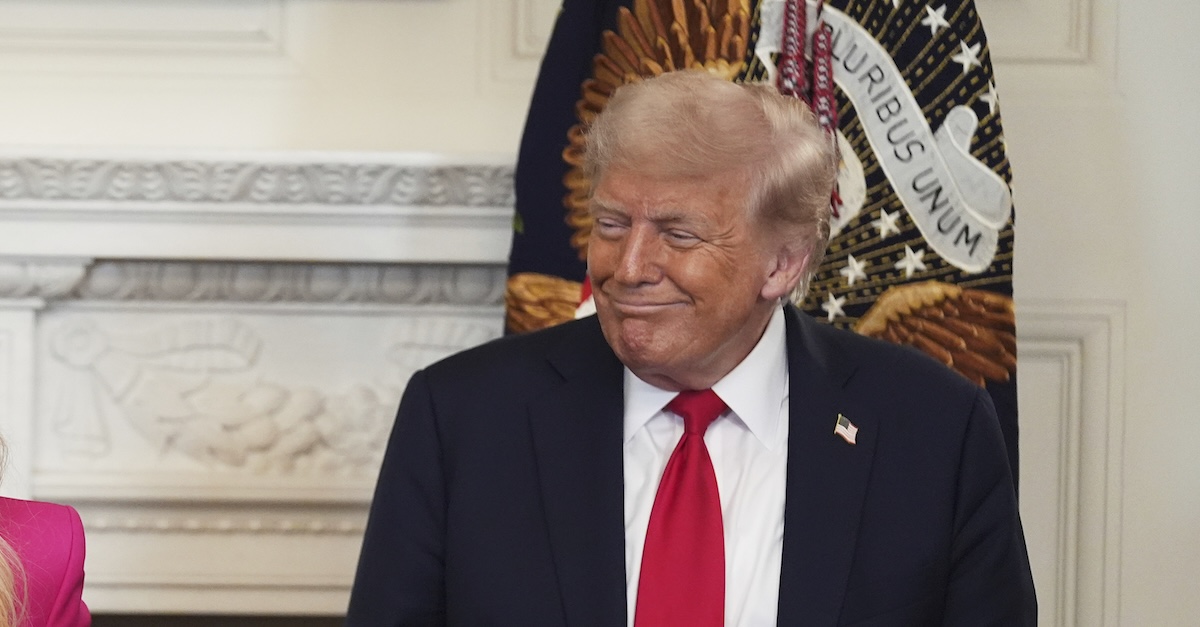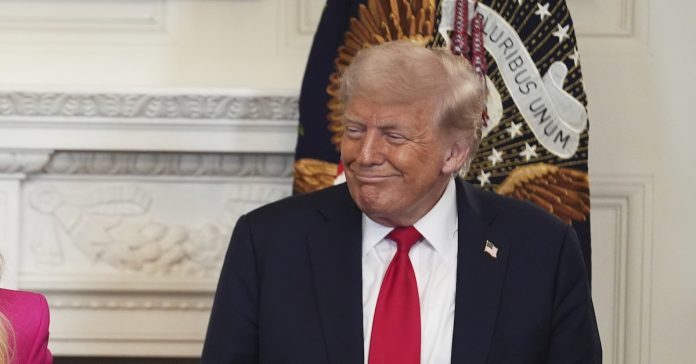
President Donald Trump at the White House Faith Office luncheon in the State Dining Room, Monday, July 14, 2025, in Washington (AP Photo/Evan Vucci).
A coalition of cities and counties led by San Francisco is imploring a federal court to continue forcing the Trump administration to comply with a preliminary injunction and subsequent clarification – and accusing the government of expressly violating the orders in question.
In the underlying litigation, the plaintiffs sued President Donald Trump and others over two executive orders — “Protecting the American People Against Invasion” and “Ending Taxpayer Subsidization of Open Borders” — issued in January and February, respectively, which threatened to cut off all federal funds for jurisdictions deemed to run afoul of federal immigration priorities.
On April 24, Senior U.S. District Judge William Orrick, a Barack Obama appointee, all-but termed the state of affairs a rerun and enjoined the executive orders with a preliminary injunction – likening the latest funding threats to a series of similarly-kiboshed threats issued during the first Trump administration.
Then, on April 28, Trump issued what the plaintiffs, in a motion to enforce the injunction, termed “yet another” executive order “which triples down on his threat to defund “sanctuary’ jurisdictions.” In turn, on May 9, Orrick shut the government down again.
Now, the plaintiffs say the Trump administration is up to its old tricks.
Love true crime? Sign up for our newsletter, The Law&Crime Docket, to get the latest real-life crime stories delivered right to your inbox
On Friday, in a six-page reply to a recent defendants’ response to the court’s order, San Francisco asked the court to make sure the Trump administration is not illegally cutting funds from a specific U.S. Housing and Urban Development (HUD) program.
“This Court has clarified that ‘[t]he Preliminary Injunction in this case reaches any subsequent Executive Order or Government action that poses the same coercive threat to eliminate or suspend federal funding based on the Government’s assertion that a jurisdiction is a ‘sanctuary’ jurisdiction,” the motion begins. “The Court has also already reminded Defendants that ‘[t]he Government cannot avoid liability down the line by ‘hewing to the narrow letter of the injunction’ while ‘simultaneously ignoring its spirit.’ Yet Defendants are doing exactly that.”
The latest alleged violation is due to a new condition on billions in previously-awarded anti-homelessness grants.
The new condition reads as follows:
No state or unit of general local government that receives funding under this grant may use that funding in a manner that by design or effect facilitates the subsidization or promotion of illegal immigration or abets policies that seek to shield illegal aliens from deportation.
San Francisco and the myriad other cities and counties have two major objections to this language.
First, the plaintiffs say it’s yet another violation of the injunction.
“Defendants have not demonstrated any connection between the conscription of local governments into federal immigration enforcement, and the housing and supportive services funded by the [anti-homelessness] grants—nor could they, because there is none,” the motion argues.
Second, the plaintiffs suggest the ensuing ordeal to defend the new, anti-immigrant language is ample parts red herring.
“Defendants point to a provision authorizing ‘other’ conditions that further the purposes of the authorizing statute, Title IV of the McKinney-Vento Homeless Assistance Act, but that statute does not relate to immigration enforcement,” the motion goes on. “Defendants next argue that the grant conditions quoted above ‘merely require compliance with federal immigration laws,’—a claim that lacks any basis in fact.”
The plaintiffs go on to argue that the court’s injunction – and clarifying order – have already dealt with the prospect of attaching immigration enforcement-related conditions on anti-homelessness funds. And, the plaintiffs say, the court has never been convinced.
“The Court’s Order Regarding Disputes found that Defendants had ‘not yet attempted to show the required nexus’ between ‘the kinds of services that the HUD [anti-homelessness] grants provide—safety-net services for the cities’ most vulnerable populations, including the homeless, veterans, and unaccompanied youth’ and ‘immigration enforcement,'” the motion goes on. “Defendants still have not shown (and cannot show) any such nexus.”
San Francisco accuses the Trump administration of trying to claim a relationship – between the HUD funds and immigration law – that does not exist. Rather, the plaintiffs say, the government is simply paraphrasing one of the enjoined executive orders to make it sound like the purported statutory condition.
From the motion, at length:
Contrary to Defendants’ assertion that the HUD [anti-homelessness] grant condition “merely requires recipients to comply with federal immigration laws,” that grant condition is plainly based on the enjoined Executive Orders and directs the withholding of funding based on lawful policies that limit local cooperation with federal immigration enforcement. The HUD [anti-homelessness] grant condition is pulled nearly word-for-word from the fatally ambiguous language of Section 2(a)(ii) of Executive Order 14,218.
The U.S. Department of Justice, for its part, also argues the recent landmark U.S. Supreme Court ruling that narrowed down the pathways to nationwide, or universal, injunctions is relevant to the dispute over the anti-homelessness funds.
“Defendants note the Supreme Court’s decision in Trump v. CASA, Inc. provides that injunctive relief must be limited to the parties in a litigation,” the government’s motion reads. “On that basis alone, extending this Court’s preliminary injunction to HUD as a non-party is improper.”
San Francisco says this argument essentially gets the high court’s decision not entirely unlike exactly backwards.
“Defendants misconstrue CASA,” the plaintiffs’ filing goes on. “That case addressed jurisprudential concerns about extending relief to plaintiffs who are not party to a lawsuit. Here, unlike in CASA, the Court did not issue a universal injunction but instead limited relief to the Plaintiffs. In order to ensure that Plaintiffs obtain complete relief, the Court enjoined ‘named defendants and any other agency or individual acting in concert with or as an agent of the President or other defendants to implement’ the enjoined Executive Orders.”
In other words, San Francisco explains how the justices issued an opinion about the propriety of fashioning injunctive relief for too many plaintiffs – coming down against broad relief. The DOJ, however, appears to be trying to extend the CASA ruling into a rule about extending the reach of an injunction to another defendant. This, San Francisco notes, is not at all what the Supreme Court addressed.
The Trump administration, in a related argument, also says allowing the plaintiffs to challenge the immigration language amounts to “overreach” that “would impermissibly expand this lawsuit far beyond what Plaintiffs have pled.”
San Francisco says both of these arguments are irrelevant – because the court did not ask for such briefing – and incorrect.
Again, the motion, at length:
Defendants’ non-responsive arguments about notice pleading and the propriety of nationwide injunctions are meritless. As this Court has held, Plaintiffs’ claims for relief—upon which they are likely to succeed—are based on ample pleadings and evidence regarding the Executive Orders’ explicit threat to end all federal funding “to the Cities and Counties (the plaintiffs in this case).” Accordingly, the Court’s Preliminary Injunction fairly reaches any federal agency “action to withhold from, freeze, or condition federal funds” to Plaintiffs on the basis of the Executive Orders. Moreover, because the Court’s relief applies only to the Plaintiff Cities and Counties, Trump v. CASA is inapplicable.

